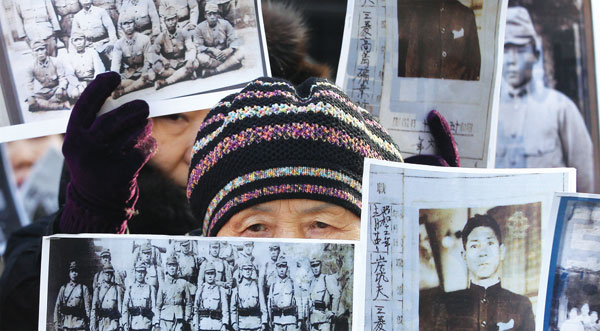Japan agrees to 'comfort women' deal




Includes 1 billion-yen fund for S. Korean victims
Reactions to the agreement reached Monday by Japan and South Korea over the thorny issue of "comfort women", or sexual slaves forced by Japanese military during WWII, were mixed.
The agreement includes an apology by Japanese Prime Minister Shinzo Abe and a decision to set up a 1 billion-yen ($8 million) fund for the victims.
|
A South Korean woman whose family members were killed by Japanese forces during World War II attends a rally in Seoul on Monday demanding full compensation and an apology from the Japanese government. Ahn Youngjoon / The Associated Press |
The results were announced after the South Korean and Japanese foreign ministers held talks on the issue in Seoul.
Japanese Foreign Minister Fumio Kishida said in a media release that the South Korean government will "establish a foundation for the purpose of providing support for the former comfort women".
Funding will be "contributed by the government of Japan as a one-time contribution through its budget".
When meeting the media with his South Korean counterpart, Kishida said Japan will contribute the money, Reuters reported.
South Korean Foreign Minister Yun Byung-se said Seoul considers the deal "final and irreversible" as long as Japan faithfully follows through with its promises.
A statement by both foreign ministers said Abe "expresses anew his most sincere apologies and remorse to all the women who underwent immeasurable and painful experiences and suffered incurable physical and psychological wounds as comfort women".
Lee Yong-soo, 88, one of the South Korean victims, said she was dissatisfied with the agreement. Of the 238 South Koreans who have been identified as former sex slaves, only 46 are still alive.
Lee told a news conference that Japan still needs to make legal compensation to the women to resolve the issue. She stressed that she will ignore the agreement, according to Japan's Jiji Press.
A support group for the survivors, the Korean Council for the Women Drafted for Military Sexual Slavery by Japan, which installed a statue of a girl symbolizing comfort women on a sidewalk in front of the Japanese Embassy in Seoul in December 2011, issued a statement denouncing the agreement.
In Beijing, Foreign Ministry spokesman Lu Kang said the forced recruitment of comfort women was a serious crime against humanity committed by Japanese militarists during World War II.
"Japan should face up to history squarely, reflect on its historical aggression and deal with related issues in a responsible way," Lu said.
US Secretary of State John Kerry issued a statement on Monday welcoming the agreement. "We believe this agreement will promote healing and help to improve relations between two of the United States' most important allies," he said.
"We applaud the leaders of Japan and the Republic of Korea for having the courage and vision to reach this agreement, and we call on the international community to support it," Kerry said in the statement.
Asked on Monday whether Japan should also apologize to the comfort women in China, the Philippines and some other Asian nations, State Department Deputy Spokesman Mark Toner described the agreement as an important step forward. "Does this agreement answer all of the remaining grievances? No," he told the daily briefing.
Abe's revisionist views have sent Japan's relations with its neighbors, in particular China and South Korea, on a downward spiral in the past few years. Many Chinese and Koreans believe Japan still owes a sincere apology for its war crimes in their countries.
Abe still has to face issues such as acknowledging the Nanjing Massacre, where some 300,000 unarmed Chinese soldiers and civilians were slaughtered; his refusal to call Japanese actions in the war aggression; the Japanese revision of textbooks; and the visit to the Yasukuni Shrine, where Class-A Japanese war criminals were buried.
Jonathan Pollack, a senior fellow at the Brookings Institution, said the agreement does not portend any significant change or potential movement in Abe's views of historical issues between Japan and China.
"President Park's pledge that the comfort women issue has been resolved 'finally and irreversibly' was sufficient justification for Abe to make concessions to the ROK he has long resisted. But it does not alter the very deep, persistent chasm between China and Japan on the legacy of the war," Pollack said.
Lyu Yaodong, an expert on Japanese foreign policy at the Chinese Academy of Social Sciences, said "Japan is shirking its national responsibility and playing word games in the deal". The foundation should be set up by Japan, rather than South Korea, he said.
Lyu attributed the closer ties between Japan and South Korea to a push by Washington, as both countries are traditional US allies.
Zhang Jingquan, a professor of Northeast Asia studies at Jilin University in Changchun, said the progress made in bilateral relations is "undoubtedly a diplomatic triumph" for Abe's cabinet, as Japan has been eager to ease tensions with South Korea on the issue.
"However, there should be no discrimination of other victimized Asian nations regarding such human rights issues," he said, calling on Japan to apologize and compensate comfort women in other countries.
Xinhua contributed to this story.
Contact the authors at chenweihua@chinadailyusa.com















